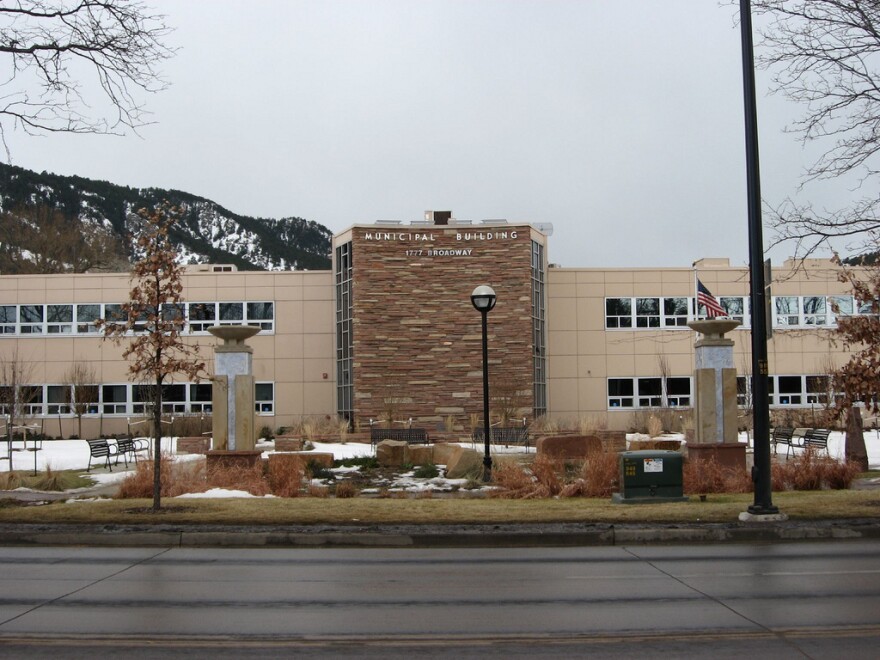This week, countries around the world met at the United Nations Climate Action Summit to discuss climate change. But it's not only nations that are looking towards solutions, we also are seeing towns and cities here in Colorado taking action.
Over the summer, the cities of Boulder and Fort Collins both declared a climate emergency. But what does that really mean?
KUNC's Colorado Edition spoke with Carolyn Elam, the Energy Manager with the Department of Climate Initiatives for the City of Boulder, and Lindsay Ex, the Climate Program Manager for the City of Fort Collins, to learn more.
Boulder's Climate Emergency

Erin O'Toole: What does it mean that the City of Boulder declared a climate emergency?
Carolyn Elam: In declaring an emergency what you're really saying is that we need to elevate the importance of the climate lens in how we make decisions within the city. So it's really putting that climtae priority into our overall decision process, where we invest and how we execute programs.
What has this meant for the city beyond the symbolic measure of declaring an emergency?
We have a lot of experience to draw on, but we're really looking at what is the next generation of strategies that we should undertake as a community.
So with Council's declaration and also guidance provided by Council to staff in the July timeframe, we're now getting ready to launch a six-month planning process to develop our next set of climate actions for the community, and that kicks off with Thursday's launch event, which is our first chance to go out to the community and get to hear their thoughts on how they want to be involved, where they think we need to be focusing on, and then that will mark a number of engagements that will happen in the coming months, with our goal to have an updated plan by early to mid next year.
I'm wondering if you could tell us a little more about the process, because it sounds like you're very concerned with and focused on having community input.
It's very important, we know that as a city government we just can't regulate or drive the kind of changes that have to happen, certainly not alone. And so really the community has to be at the forefront of that.
And so this is our first chance to bring people together, we have well over 200 people registered to join us Thursday night, and then to start down this planning process with us. And so that will be additional workshops or focus groups, things that we hear from the communtiy they want to participate in in the coming months to help us figure out really what are the next steps. What should the city government focus on, what actions should the community take on, and where do we need to seek additional partners to really drive the system change we need.
In terms of a timeframe, when do you expect Boulder to adopt a climate strategy to correspond with the declaration?
We are looking at least a three month process where we engage with the community to get some preliminary input and then refining that in the first quarter of next year. So our goal is to go to our city council with an updated plan sometime between March and June of next year, so that by summer of next year we're actually into the implementation phase of the new strategies and the updated plan.
Fort Collins' Climate Emergency

Henry Zimmerman: Tell us what it really means for the City of Fort Collins to reaffirm its commitment to the climate emergency.
Lindsay Ex: What it means in Fort Collins is a continued investment in positive, pragmatic and cost-effective solutions that work for our community. One of the importance of cities taking action on climate is that we're on the ground innovators and communities are the best place where we can scale up practical solutions and we're also in a unique position to design solutions that address our community values.
So whether that's planning our neighborhoods, how community members are able to move through our community, or we sustainably manage the resources that we consume, the re-affirming our commitment really recognized that sense of urgency and continued our commitment to engage at all levels.
When you say engage at all levels, has the city taken action yet as a result of this movement?
The main thing that we're doing right now is we're kicking off an update to our climate action plan, our energy policy and our road to zero waste plan, which we're collectively calling "Our Climate Future."
And we have an opportunity for our community members and organizations to engage in that planning process to really help individuals and organizations in the community spark conversations, provide feedback, and consult with city staff on this planning effort. So we have applications open right now and through October 2 for engaging with "Our Climate Future."
Are there any measurable goals that you see the city implementing anytime soon?
Absolutely. The goals that "Our Climate Future" are focused on are ambitious 2030 goals. So council has a commitment to achieve 100 percent renewable electricity by 2030, zero waste by 2030, and also an 80 percent reduction in our community's emmissions over all.
The important thing that we're focused on right now with "Our Climate Future" is designing equitable solutions to achieving these goals. So technically, we know how to get to each of the goals, but what's important in these planning efforts is to figure out what's right for Fort Collins.
This conversation is part of KUNC's Colorado Edition for Sept. 25. Listen to the full episode here.






